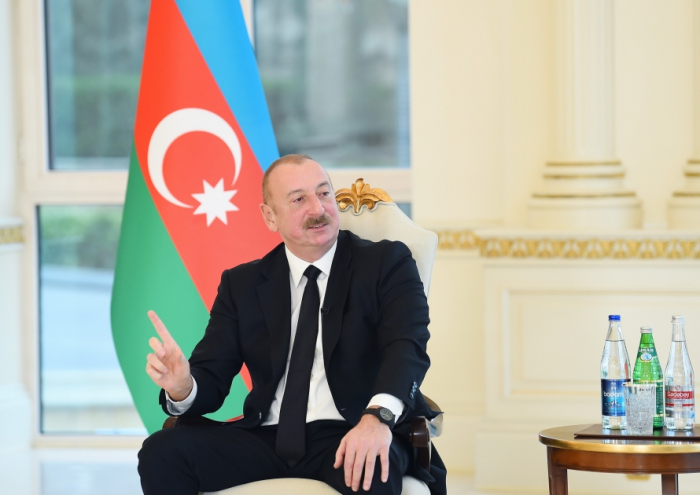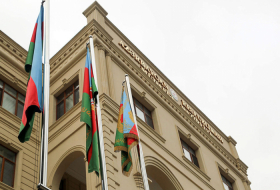On January 8, President Ilham Aliyev of Azerbaijan outlined his country’s primary objectives, priorities, and current challenges for the upcoming year in an interview with local TV channels. The significance of these messages is heightened as Azerbaijan approaches its presidential elections on February 7. Notably, these elections mark a historic moment in Azerbaijan’s post-Soviet history, covering the entire territories of the country following the collapse of the illegal separatist regime in the Karabakh region. The regime was dismantled during one-day anti-terror operations conducted by the Azerbaijani Armed Forces in September 2023. The past year has been transformative for the Azerbaijani people, who endured three decades of occupation in their territories. President Aliyev expresses optimism that his country will build upon these achievements and set new targets in the years to come.
Foremost, it is crucial to note that Azerbaijan has embarked on a new era marked by the restoration of its territorial integrity and the resolution of the Karabakh conflict. This ushers in a new socio-political landscape for the country, which, in preceding years, had consistently centered its agenda on endeavors to liberate occupied territories. The “Karabakh” issue has been the unifying ideology of the country and overshadowed all other economic and political challenges. The year 2024 marks the beginning of a period where the Azerbaijani people are no longer burdened by these tasks.
Therefore, it is not a mere coincidence that the Azerbaijani government has opted for early presidential elections, deviating from the originally scheduled timeframe (April 2025). President Aliyev stressed out the “beginning of the new era” as the first reason behind the rescheduling of the elections. The second reason articulated by the President is also related with this sentiment. “I thought that the first elections to be held across the entire territory of our country should be the presidential elections”, he said, adding that “If we were to hold this election on time, i.e. in April 2025, then municipal elections would be the first to be held. I thought that would not be right.”
President Aliyev devoted significant part of his interview to the discussions over the Armenia-Azerbaijan peace process. The successful pursuit of this process will be necessary to open a new chapter in the bilateral relations between the two countries. President Aliyev highlighted the interest of his country in a peace treaty, normalization of relations, and re-opening of the regional transportation links. In doing so, he listed several challenges that continue to impede progress in reaching a peace treaty. These challenges primarily stem from Armenia’s refusal to abide by its commitments undertaken in the trilateral statement of November 10, 2020 which mandates the “unimpeded” passage between the western parts of Azerbaijan and the Nakhchivan exclave. Additionally, Azerbaijan’s preference for a bilateral commission to ensure the implementation of the peace treaty contrasts with Armenia’s insistence on including international guarantors. While these and other challenges at the present stage of the peace process may seem less complex than the more fundamental territorial issues of the earlier period, they possess the potential to significantly prolong the peace talks with detrimental impact on regional peace and security.
This year has also concluded Azerbaijan’s chairmanship at the Non-Aligned Movement (NAM) where the country has presided since 2019. “[This chairmanship] has given us invaluable experience in leading the largest international entity after the UN”, said President Aliyev. Now Azerbaijan is handing over the chairmanship of a more revitalized and reinvigorated institution. The NAM has taken tangible steps towards institutionalization during the chairmanship of Azerbaijan. “So, we created parliamentary, youth and women’s platforms. And it somehow breathed life into the Movement, and we held several summits and ministerial events”, President Aliyev proudly stated about Azerbaijan’s contributions to the Movement of 120 countries.
Azerbaijan’s active role within the NAM is planned to be sustained beyond the country’s chairmanship. This will be reflected in multiple aspects. For instance, the Headquarters of the NAM Youth Network, which was created at the initiative of Azerbaijani President, will continue to be based in Baku. The country will also support the efforts of the Baku Initiative Group, which was launched last year to support the anti-colonial struggles across the world. France turned out to be a major country widely criticized by Azerbaijan and many other member states of the NAM for neo-colonial policies vis-à-vis Comoros, New Caledonia and other Paris-administered overseas communities and territories.
That said, the year 2024 in Azerbaijan will be undoubtedly dominated by the preparations for the 29th Conference of Parties (COP29) to the UN Framework Convention on Climate Change in November. “This will be a great experience for us. Because I still think that this is the world’s number one international event, an international conference, and from the point of view of the attention of the world community, it is more prestigious than the UN General Assembly”, President Aliyev stated. The Azerbaijani capital is set to host around 80,000 foreigners within this conference.
The opportunity to host this international climate conference is also seen in Azerbaijan as a support to the country’s green transition. The Azerbaijani government sees this transition as an effort to diversify the country’s economy and get it prepared for the post-oil future as well as an important responsibility to fight global climate change. Azerbaijan has enormous potential for the production of renewable energy and export it abroad. The International Finance Corporation, which is a branch of the World Bank, has confirmed the potential of Azerbaijan in the Caspian Sea at 157,000 megawatts. Azerbaijan has signed a number of contracts with international companies to develop its capabilities to produce renewable energy and these efforts will top the country’s agenda in the coming years.
In summary, President Aliyev’s delineation of Azerbaijan’s post-Karabakh vision unveils a nation embracing a new era of restored territorial integrity and resolution of the longstanding conflict. The decision to advance presidential elections symbolizes a strategic move towards shaping the country’s future, echoing the sentiment of a transformative period. The commitment to the Armenia-Azerbaijan peace process remains pivotal, despite challenges, as Azerbaijan seeks normalized relations with its neighbor and regional connectivity across the South Caucasus. As Azerbaijan concludes its impactful chairmanship at the Non-Aligned Movement, the nation pledges continued support for NAM initiatives, ensuring a sustained global presence. Looking ahead, 2024 promises a spotlight on Azerbaijan as it prepares to host COP29, a pivotal opportunity to showcase its commitment to a green transition and global climate action. The country’s focus on renewable energy signifies a dedicated effort to diversify its economy and contribute meaningfully to the post-oil era while championing environmental responsibility on the world stage.
AzVision.az
More about:
















































